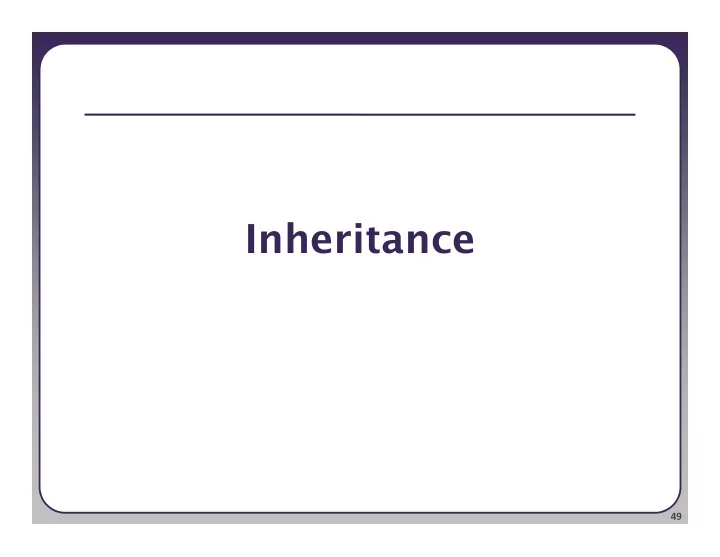

����������� 49
����������� Definitions = way of forming new classes based on existing ones = way to share/ reuse code between two or more classes Terminology � superclass : Parent class being inherited from / extended / specialized. � subclass : Child class that inherits behavior from superclass. • gets a copy of every field and method from superclass � is-a relationship : Each object of the subclass also "is a(n)" object of the superclass and can be treated as one. 50
������������������ public class NameofSubClass extends NameOfSuperclass { Example public class Lawyer extends Employee { ... } By extending Employee , each Lawyer object now: � receives a copy of each method / field from Employee automatically � can be treated as an Employee by client code � Lawyer can also replace ("override") behavior from Employee. 51
������������������������������� Definition � To write a new version of a method in a subclass that replaces the superclass's version � No special syntax required to override a superclass method. Just write a new version of it in the subclass. public class Lawyer extends Employee { // overrides getVacationForm in Employee class public String getVacationForm() { return "pink"; } ... } 52
������������������������������� Definition � To write a new version of a method in a subclass that replaces the superclass's version � No special syntax required to override a superclass method. Just write a new version of it in the subclass. public class Lawyer extends Employee { // overrides getVacationForm in Employee class @override public String getVacationForm() { return "pink"; } ... } https://stackoverflow.com/questions/94361/when-do-you-use- javas-override-annotation-and-why 53
��������������������������������� �������� Subclasses’ methods may use superclasses’ methods/constructors: super. method ( parameters ) // method super( parameters ); // constructor public class Lawyer extends Employee { public Lawyer(String name) { super(name); } // give Lawyers a $5K raise (better) public double getSalary() { double baseSalary = super.getSalary() ; return baseSalary + 5000.00; } } 54
��������������������������������� ������� Rules = � Subclasses are not allowed to use superclass’ private fields • i.e. Inherited private fields/methods cannot be directly accessed by subclasses • aka The subclass has the field, but it can't touch it ? public class Employee { How can we allow private double salary ; subclasses to access / ... } modify these fields? public class Lawyer extends Employee { ... public void giveRaise(double amount) { salary += amount; // error; salary is private } } 55
��������� �!�������� ������"������� protected fields or methods may be seen/called only by: � the class itself, its subclasses, other classes in same "package" Syntax protected type name ; // field protected type name ( type name , ..., type name ) { statement(s) ; // method } Example public class Employee { protected double salary ; ... } 56
���������������������������� Problem � IF we replace our constructor w/o parameters w/ a constructor that requires parameters in Employee � THEN our subclasses do not compile; Lawyer.java:2: cannot find symbol symbol : constructor Employee() location: class Employee public class Lawyer extends Employee { ^ Solution � IF we write a constructor (that requires parameters) in the superclass � THEN must now rewrite constructors for our employee subclasses 57
������������������������������# Rules = Constructors are not inherited � Subclasses don't inherit the Employee(int) constructor. � Subclasses receive instead a default constructor that contains: public Lawyer() { super(); // calls Employee() constructor } But our Employee(int) replaced the default Employee() . � The subclasses' default constructors are now trying to call a non- existent default Employee constructor. 58
���������������������������������� ������������� Syntax super( parameters ); Example public class Lawyer extends Employee { public Lawyer(int years) { super(years); // calls Employee c'tor } ... } Rules – The super call must be the first statement in the constructor 59
Recommend
More recommend